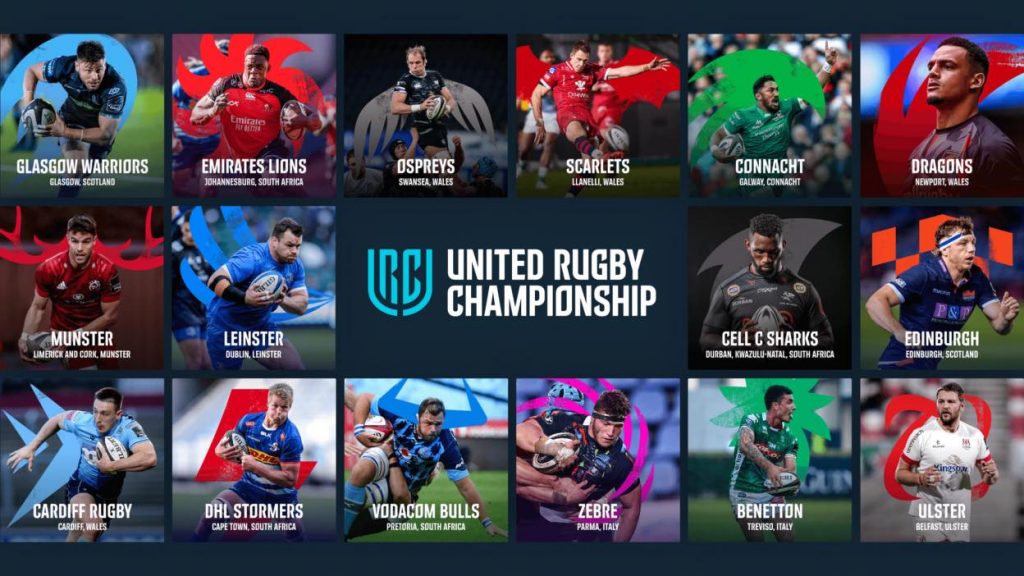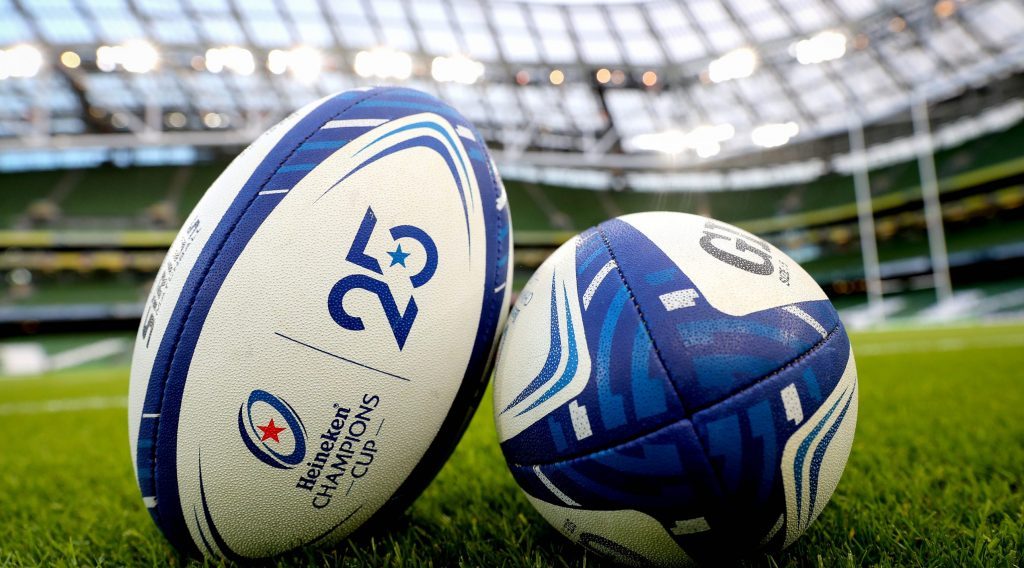United Rugby Championship – Frequently Asked Questions
Latest posts by Will Matthews (see all)
- Andrew Porter hits back at France head coach Fabien Galthie - March 12, 2025
- Jack Crowley offered massive deal to leave Munster Rugby - March 11, 2025
- Ireland win tops the ranks in list of ‘The 25 Greatest Six Nations Moments’ - March 11, 2025
Championship.
Following today’s announcement, the United Rugby Championship have confirmed that the brand-new league format will consist of a single league table and 18 rounds of action with 16 teams across five territories.
Four regional pool tables will determine the six Home and Away fixtures played by each team in their territory.
The remaining 12 games will be made from an even number of Home or Away games against the other teams in the league. Regional pools were designed to amplify rivalries and competitiveness among nations.
Here is a list of the most frequently asked questions to help you fully understand the new competition.
Q: What is happening?
The Guinness PRO14 is changing into a 16-team league called the United Rugby Championship and will include South Africa’s former Super Rugby teams – Cell C Sharks, DHL Stormers, Emirates Lions and Vodacom Bulls. These teams will play in the league against the 12 existing teams from Ireland, Italy, Scotland and Wales.
Q: So, it’s back to a league format?
Yes, all 16 teams will be ranked from 1 to 16 in a single-standing league table to decide who reaches the Quarter-finals. Additionally, regional pools will exist to ensure home & away derby fixtures are played.
Teams will be seeded from 1 to 8 and will receive home advantage according to their seeding. A full round of Quarter-finals and Semi-finals will take place to produce two teams who will qualify for the Grand Final.
Q: How will the fixtures work and how many games will my team play?
Every team will play 18 games in the regular season comprising of:
6 Home AND away fixtures against their regional pool opponents
12 Home OR away fixtures against the other 12 teams in the league
This means derby matches are unaffected, and every team plays each other at least once each season.
Q: Why are you changing the name of the Tournament?
The United Rugby Championship represents elite club rugby across two hemispheres. Each team and territory offer something unique to the game; and although we are unified by our love of the sport, the rivalries at the heart of the game remain the reason we watch it.
With such a complete change in format and the addition of the big-name South African sides, it is the right time to change the name of the tournament that is more fitting and will have much greater longevity. It’s fair to say using numbers in the name hasn’t quite worked out so well.
Q: Why ‘United Rugby Championship’?
URC symbolises a new era for club rugby, while not forgetting our roots as the Celtic League. The URC brings together teams, players and fans from iconic locations across the North & South. Over 140 names were tested – including PRO16 and PRO Rugby Championship – but ultimately United Rugby Championship rose to the top based upon feedback from stakeholders across a number of internal and external surveys which have shaped the brand values and expectations from teams, fans, media and broadcasters.
At its core, the URC seeks to be Bigger, Bolder and Stronger that the previous incarnations of the league with a more familiar format, no crossovers with international weekends and more teams capable of winning the title.
Q: What is the effect of fewer regular-season games and no crossover with international weekends?
Fans, broadcasters and media will always welcome new faces and breakthrough Next-Gen talents, but the message has been consistent that they want to see the top internationals play more often in the league. This will always have a natural challenge given that 16 teams are feeding into five national squads, so by removing the crossover with international weekends everyone can expect to see the top talent playing more often than in the past.
With expectations that the competitiveness of the league will be increased by the addition of the South African teams, it will ensure that every game counts in the race to reach the knock-out stages.
The regular season will consist of 18 rounds followed by three rounds of knock-outs including the Grand Final to provide an overall total of 21 game weekends per season. This is down from a total of 24 when the tournament was previously a 12-team league.
Q: Regional pools were mentioned earlier on, how will they work?
The regional pools are a mechanism to ensure all home and away derby games are played while also recognising a champion for that region each season. The Irish, South African and Welsh teams all have their own natural pools of four while the Scottish and Italian teams will enter into their own pool of four because each there are only two participants from each nation involved.
This also means that Edinburgh and Glasgow Warriors, Benetton and Zebre will only play two derby games per season rather than three in the PRO14 format. The fixtures from the regional pools will account for six games with the remaining 12 games played against all other teams in the league. Points from all 18 games will be used in the single-standing league table and for the regional pools.
Q: How will Champions Cup qualification work?
A total of eight teams from the United Rugby Championship will qualify for the Heineken Champions Cup. The winner of each pool will qualify, followed by the next highest ranked teams in the main league table.
From the 2022/23, South African teams will be able to enter the Champions Cup if they have finished in the qualification places in the URC standings in 2021/22. Regional pool mechanic will ensure at least one team will qualify.
All points won during the URC season will contribute to rankings in the regional pools and the winner of each pool will earn a place in the Champions Cup for the following season. This addition to the format is expected to add even greater intensity to these age-old rivalries.
The remaining four places will then be awarded to the four highest-ranked teams in the single-standing league table who did not win their regional pool. Final seeding for the Champions Cup will be based upon the league positions of all eight teams.
Q: How are home or away fixtures decided?
The initial balance fixtures will be predicated on a number of factors including: stadium availability; club preference; player welfare, broadcast rights and the accommodation of mini‐tours involving fixtures with South African clubs. Each year the home or away fixture will alternate much like it does in the Guinness Six Nations, so if Ospreys played away to the DHL Stormers in Cape during the 2021/22 season, then they would host the Stormers in Swansea the following year and the fixture would continue to alternate on that basis.
Q: How will teams cope with travelling to and from South Africa?
Visiting teams will require a 7-day turnaround leading into these fixtures. This will include 5 ‘clean days’ that do not involve any travel. Flights between Europe and South Africa are overnight which will allow players to rest during their travel while training facilities and accommodation venues have already been road-tested from previous Guinness PRO14 and Super Rugby fixtures.
Q: How many cross-hemisphere away games will teams play?
Teams from the ‘North’ (UK, Ireland, Italy) will play two (2) away games in South Africa each season and the aim is for these games to be played back-to-back. Teams from South Africa will play six (6) away games in the North and most likely require three-game tours.
Q: What Covid safety procedures have been introduced for cross-hemisphere travel?
It is widely expected that the majority of player groups, coaching teams and support staff will have been vaccinated ahead of the 2021/22 season. However, league organisers will continue to follow the guidance of the Government and local Health Authorities, as well as the Medical Advisory Group, which consists of the lead medical chiefs from each of the five unions represented in the URC.
This group has provided robust direction throughout the pandemic and has consistently updated practices and policies as the science surrounding Covid-19 has advanced. The appropriate testing and Covid safety protocols will continue to exist, while all travelling teams will be based in facilities which meet Covid safety requirements.
Q: How will the knock-out stages work?
After 18 rounds, the top eight teams will be seeded 1 to 8 with the four highest-ranked teams having home advantage for the Quarter-finals. That seeding will also determine who plays at home in the Semi-finals.
How seeding will work for Quarter-final fixtures: 1st v 8th , 2nd v 7th, 3rd v 6th, 4th v 5th
Each season the URC Grand Final will be held at a destination venue similar to the Guinness PRO12 and PRO14 deciders held between 2015 and 2019.
Q: What are the benefits of the new format?
Less games to conflict with international weekends, one league table in place and a full Quarter-final round of four games which will increase knock-out games from five to seven.
Q: Why are the Toyota Cheetahs and the Southern Kings no longer involved in this league?
The impact of the Covid-19 pandemic had three major effects on the make-up of the Guinness PRO14. Firstly, cross-hemisphere fixtures were not possible in 2020 and for much of 2021 and, in addition, the Southern Kings were dissolved in September 2020. Finally, the break-up of the Super Rugby tournament as it created an opportunity for the South African Rugby Union’s executive committee to vote for their top four ‘franchises’ to join in place of the Cheetahs and Kings.
Q: When will the season start & finish?
The first round of the URC take place on the final weekend of September, and the URC Grand Final weekend will take place in mid-June 2022.
Q: How long will the URC remain in this exact format?
The format of the URC will remain in this format for at least the next five years. The intention is for the league not to change format again.




